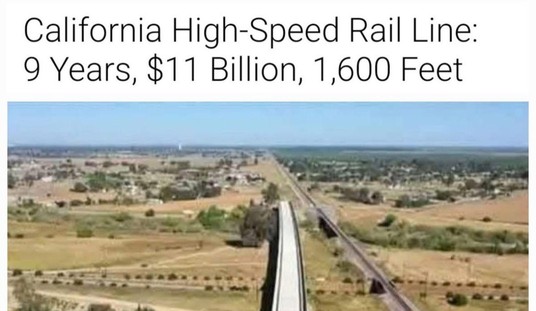Good question from Larry O’Connor. There’s nothing the media enjoys more than lecturing about accountability. (Wait, correction: They enjoy lecturing about their own importance to democracy more.) How’s about a little accountability for yesterday’s grand fark-up, then?
It used to be that if you requested anonymity from a media outlet and then gave it bad information, their obligation to protect that anonymity evaporated. Call it breach of contract: In exchange for actual facts, a paper would shield the source from retribution. NBC’s source didn’t deliver actual facts, so why not blow him up? It wouldn’t be a matter of pure payback for humiliating the network, either — although partly it would be that. It would perform a public service by alerting the rest of American media that NBC’s source is no longer to be trusted by anyone. Burning garbage sources theoretically improves the quality of information in public circulation going forward.
That’s the way things used to work, at least in theory. Why don’t they work that way now, wonders O’Connor:
Now that we know NBC News was wrong with this story that relied on the veracity and expertise of their anonymous sources, don’t we deserve to know who they are? Why protect these sources? We deserve to know who lied to NBC News about this story…
Why would NBC News protect a source that lied to them? Why would they protect a source that got something so terribly wrong? Why refuse to explain to their viewers HOW they got the story wrong? Is their source an incompetent or a liar? Is your reporter a liar? These things don’t just… happen. Someone screwed up.
And we, the American people, deserve to know. This is the presidency we are talking about, after all.
One possibility, identified by O’Connor, is that NBC’s source didn’t get it wrong. NBC itself got it wrong. Attorney Ken White wondered about that too:
My question: did NBC's sources get this wrong, or did NBC reporters not understand what their sources were describing and confuse a pen register for a wiretap? https://t.co/PkTpKIVaQW
— IncitementToResurrectionHat (@Popehat) May 3, 2018
You would think the crack NBC investigative team would have consulted a legal expert, though, if there was any in-house confusion about the difference between a pen register and a wiretap. Which there probably wasn’t: It’s not as if the government listening in live on someone’s calls, let alone the president’s lawyer’s calls, is easily misunderstood as no different conceptually from checking their phone logs. You can have a low opinion of NBC and still think there’s someone in the news department there who grasps the distinction and would have demanded clarification if the source was vague. Especially on a scoop of this magnitude.
So yeah, the source probably had bad information himself or deliberately misled them. Why haven’t they burned him?
An obvious possibility is that that person has provided useful factual information to the network before. If you’ve got “two people with knowledge of the legal proceedings involving Cohen” willing to talk to you, as NBC did yesterday, you’re going to think carefully about alienating them by blowing them up, particularly if they’ve been good sources in the past. They might have a real bombshell for you tomorrow, after all. And even if they don’t, you’re potentially scaring away other useful sources by making a public example of them. If, say, one of Cohen’s close friends is willing to whisper to the media about what’s going on behind closed doors, which news outlet should he gift with his information? NBC, which will ruin his life by outing him if he passes along something that turns out not to be true, or ABC/CBS/CNN/Fox? The old bargain, that a source gets to keep his anonymity if and only if his information is accurate, doesn’t hold anymore in an age of fierce competition among media.
But then, I’m not sure it ever really did hold. Competition among media has always been fierce. It’s an old journalistic ethic that an outlet is *entitled* to burn an anonymous source if he passes along bad info, but how often have they ever availed themselves of that entitlement? For every bad source who gets burned, there are probably a thousand who get off scot-free, with only an internal notation at the paper or news network not to use him again left in his wake.
In fact, the tradition of burning bad sources after a garbage story lands with a thud (if it was ever really a tradition) has been replaced with a new tradition. In keeping with the media’s bottomless sanctimony about itself, the thing to do now when an outlet blows a major story is to congratulate them for owning up to it.
It was a bad mistake. But NBC fessed up and corrected the error… A clear contrast with Trump's approach https://t.co/pomuBrNQNN
— Brian Stelter (@brianstelter) May 4, 2018
It's a shame that the White House and its allies are going to attempt to use NBC's correction to support their narrative about fake news, when admitting to and quickly correcting a mistake is what you do only when you care about facts and honesty.
— Olivia Nuzzi (@Olivianuzzi) May 3, 2018
That wouldn’t bug me as much if it followed a meaningful period of soul-searching and contrition by the outlet and criticism from colleagues for the mistake first. But no, increasingly this is the first stop on the “major media screw-up” train after the screw-up occurs: They acknowledged it. They notified us of the error. They’re better than Trump! Hooray for media. Watch for it on journalist Twitter the next time someone gets a story wrong. It won’t be long.








Join the conversation as a VIP Member